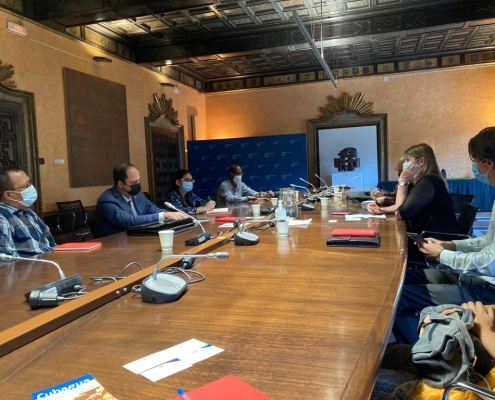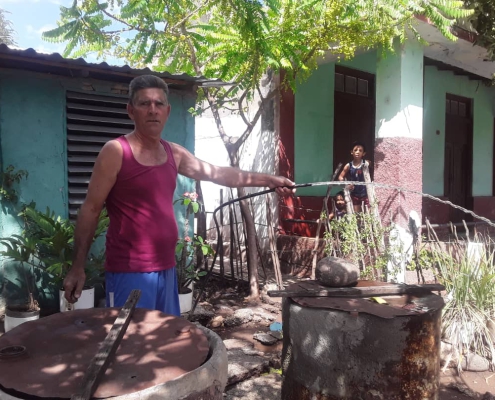Activities 2022

The program for the Improvement and expansion of drinking water and sanitation services in small Cuban cities (CUB-004-B) has four main objectives:
- Rehabilitation, expansion, and improvement of four drinking water systems affected by the hurricanes, located in La Palma, Jatibonico, Cueto, and Guisa.
- Rehabilitation, expansion, and improvement of the water supply to the municipal capital of Báguanos.
- Expansion and improvement of Circuit 3 in the southern area of Guantánamo.
- Rehabilitation of a training center for INRH technicians.
At present, the program is nearing completion. The Guisa and Cueto plants show considerable progress and have significantly improved water service to the municipalities of La Palma, Cueto, Báguanos, and the southern area of Guantánamo. The Jatibonico aqueduct is 98% complete, and the water treatment plant is 97% complete.
As for the Cueto aqueduct, the earthworks where the pumping station will be built have been completed, and civil construction will begin in 2023. The water treatment plant is 60% complete. The Guisa aqueduct is 99% complete regarding networks and pipelines, and the water treatment plant is 95% complete.
The Program for the improvement and sustainable management of the water service in the municipalities of Cueto and La Palma (CUB-005-B), municipalities in which the Water Fund has been working since 2010 through two previous programs: CUB-001, already completed, and CUB-004, currently being finalized, is also underway. This new intervention, endowed with 650,000 euro from the Water Fund, proposes actions to improve the two municipalities’ water infrastructure and strengthen the services’ management. To this end, we will work on the following aspects:
- Infrastructure improvements: rehabilitation of the La Palma and Marcané DWTPs.
- Strengthening the management of water operators in the two municipalities.
- Sensitization of the population.
For now, the rehabilitation of PTAT Ramón 2 (part of the Cueto Project) has begun. It should also be noted that the works have been included in the local economy plan by INRH, and the agency’s contribution has been increased.
Finally, the Program to Improve Integrated Water Management in the Tributary Basins of the Bays of Havana and Santiago de Cuba (CUB-003-B) is the intervention currently facing the most significant difficulties and may require a new extension to complete its execution. 8.6 million (2.8 million from the Fund’s grants). This program aims to intervene in three communities in the Havana Bay tributary basin (Matilla, San Matías, and La Prosperidad). Following the change in the program’s portfolio in 2021, due to difficulties in the execution of a fourth project in the Monterrey community, it was decided to replace it with actions for renovating and improving the central sewerage system in Havana. The plan has also initiated institutional strengthening and training activities in the Havana and Santiago de Cuba bays.
OTHER PROGRAMMES ASSOCIATED WITH THE FUND
In addition to the FCAS programs, there are currently two other initiatives in Cuba related to Water and Sanitation, financed with AECID funds:
- Technical solutions for treating industrial wastewater in the Bay of Havana, with a grant of 250,000 euro distributed in a cash grant and in-kind assistance (CUB-SECT-101 and CUB-SECT-257).
- Support for the sustainable management of water resources in Cuba: 750,000 divided into two grants, one in cash and one in kind, CUB-SECT-102 and CUB-SECT-237.
These programs provide technical and specialized support to promote wastewater treatment, institutional strengthening, and aspects related to water governance and sustainable water resources management.
In July, a group of technicians from the National Institute of Water Resources of Cuba (INRH) visited Spain to learn about and share experiences with various organizations involved in water management in our country.
COUNTRY CONTEXT

The presence of the Water Fund has been constant in Cuba since its origins, with a total of four major programs and a donation of 11.7 million euro, in addition to other interventions implemented directly by AECID but related to water and sanitation to promote the sustainability of the actions carried out.
Significant work has been carried out with this country to strengthen the sector’s institutions and support the construction or rehabilitation of basic infrastructures. Despite this, only essential water services are available to most of the Cuban population, around 97%, according to the JMP 2020.

